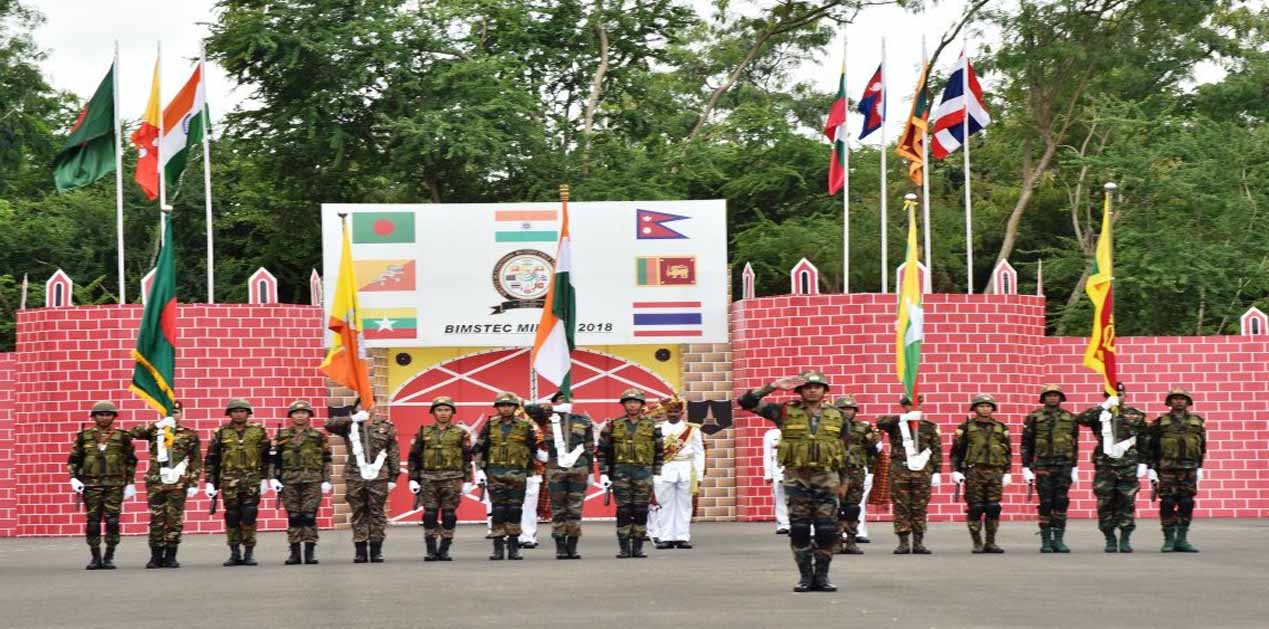The first ever Field Training Military Exercise or MILEX-18 of the seven member countries of the Bay of Bengal Initiative for Multi-Sectoral Cooperation (BIMSTEC), has been organised at Indian Army`s Foreign Training Node at Aundh, in Pune from 10th to 16th September this year. This platoon level week-long exercise on India`s initiative, has been participated in by all the BIMSTEC members except Nepal and Thailand, who were represented by their non-military and military observers respectively. Nepal had initially agreed to participate in a full scale manner and send its army chief for the final ceremony, but had withdrawn just before commencement of the exercise.
BIMSTEC`s objective as per the founding Bangkok Declaration of June 1997, is promotion of a peaceful, prosperous and sustainable Bay of Bengal region with emphasis on a wide array of cooperation among its members, for creating an enabling environment promoting active collaboration and mutual assistance. These laudable objectives cannot be attained if terrorism breeds in this milieu. MILEX-18 was aimed at bringing about inter-operability and tactical cooperation among the armed forces of its members for combating terrorism, particularly of the semi-urban variety, synergising their counter-terrorism efforts and sharing the best practices. Nepal`s foreign minister had however sounded a discordant note at the time of the recently held 4th BIMSTEC Summit at Kathmandu itself, by stating that the multilateral forum is for promoting regional development which does not extend to military exercises.
The security scenario, internal and external, of the BIMSTEC members vary from country to country. However, the impact of terrorism affects most of these countries, though with shades of difference. Nepal`s belated withdrawal from the exercise, appears to have struck a politically jarring note to this well-planned endeavour. To an extent, this development may seem to impact India`s efforts to develop a consensual approach in combating terrorism with the resources of these countries, without external influences and pressures. India therefore needs to view the Nepal incumbent government`s decision with circumspection without abandoning its BIMSTEC military initiative within a limited sphere, as has been attempted of late, manifesting in MILEX-18 and the exercise review, training and operation oriented discussions planned among the army chiefs of these countries, immediately after the exercise.
The decision of Nepal Government led by K.P. Oli of the Communist Party of Nepal (United Maoist Leninist) against full-fledged participation in the multi-army exercise and supported by Rastriya Prajatantra Party Nepal, Madhesi Rights Forum-Democratic and 13 other small parties, prima facie appears to have been affected or rather influenced by internal opposition in his country. There is a view also that, the present government had its own reservations in the matter, and is using the stance of political opposition as an alibi. Kathmandu has been evincing shades of variance in its approach on issues of bilateral relations with New Delhi since it assumed power. The Oli Government`s sensitivities towards India, however, have a legacy from the time the present constitution was being deliberated upon. The present constitution did not evolve as India had perceived, providing for a more ethnic-linguistic federal entity with a province for the Madhesis of the southern terai region bordering India.
Nepal relations with India seem to get exacerbated with the slightest of impediment arising in bilateral transactions. Any issue impacting trade and commodity flows through India to Nepal causes irritation and is played up by elements not only inimical to India, but also those posed in political opposition to Oli and his party. In such circumstances and the recent backdrop, the Oli Government seems to have considered it as an expedient to derail India`s initiative on the BIMSTEC military exercise within a limited sphere as mentioned above. Even the recent unforeseen Majerhat Bridge collapse in South Kolkata, which temporarily impeded flow of essential goods after unloading at Kolkata port docks to Nepal through the bridge, was played up in Nepal`s domestic circles as a matter of concern for that country. As per past experience, any benign or gentle advice from New Delhi to Kathmandu for suggestive action towards assuaging the sentiments and accommodating economic welfare issues and political contentment of the Nepalese people of its southern terai region bordering Uttar Pradesh and Bihar states of India have been viewed with suspicion and consternation by the incumbent political executive in Kathmandu. This may explain the sudden turn-around by the Oli Government from earlier commitment to participate in the BIMSTEC military exercise in India.
India however, should not give undue weightage to the above-mentioned Nepal Government`s posture on MILEX-18. Over-sensitivity of New Delhi would imply a more than equal concern for Kathmandu`s responses and proclivities vis-à-vis the other five BIMSTEC member countries. The other countries may feel that India is more concerned with its strategic position within South Asia and her South Asian neighbours, and is using the BIMSTEC only as a leverage to bolster her position in the Indo-Pacific region without any intrinsic concern for multi-faceted development needs of the member countries in a manner which reinforces each other along the Asian multi-lateral east-west highway axis. The other BIMSTEC partners would consequently not be enthusiastic on viewing India as the lead country within the grouping and accepting India`s pivotal role in promoting infrastructural, commercial and other multi-faceted exchanges through the medium of BIMSTEC. Without overplaying the Nepalese MILEX-18 non-participation issue, India will have to manage its relations with Nepal – particularly in the military domain, to the extent that the same does not bring any disharmony within the BIMSTEC framework. Nepal should be encouraged to be an active partner of the grouping, notwithstanding that the geo-political orientation of that country is more towards its northern and southern neighbours ie. China and India.
The China factor looms large in any development in India-Nepal bilateral relations and also on the entire BIMSTEC region because of the member states geo-political disposition including that of Sri Lanka and Indonesia which are not physically contiguous. Therefore, India will have to devise appropriate strategy to keep BIMSTEC vibrant even with a degree of limited intra-grouping military engagement, eg. on counter-terrorism, narcotics control, disaster management, etc. without any manifestation of anti-China posture. Nepal can also be kept involved in such activities without any detrimental proclivities on the part of the Government in Kathmandu on Nepal bilateral relations, provided a modicum of sensitivity is shown by Government of India at the appropriate level towards internal matters of Nepal, particularly towards adopting a more nuanced approach on intra-country political and ethnic contentious issues. It will be in India`s overall interest to allow the present constitutional framework to operate without turbulence for some time.
The traditional fraternal relations between the Gurkhas of Nepal and India, and also an accommodative and friendly posture of the military elite of the Nepalese Army, can play their due role if dealt with adroitly by Government of India at the political level, and the Indian military factored in to play an active role within a politically pre-determined framework. The significance of nearly 32000 Gurkha recruits into the Indian Army and a large number of Indian Army pensioners in Nepal also cannot be overlooked. In the case of MILEX-18, it is understood that the military leadership of Nepal were well disposed towards participation in the exercise notwithstanding the political predilections of the Oli Government.
(The author is a retired IDAS officer, who has served in senior appointments of Government of India, State Governments and is presently Adviser to a North-East State Government. The paper is the author’s individual scholastic articulation.)
Image Source: https://pbs.twimg.com/media/DnSgRmsXsAA4Fuy.jpg










Post new comment